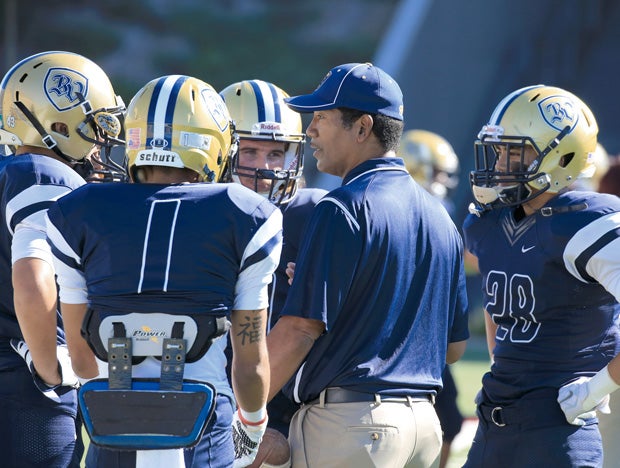Video: Matchup - Gold Beach High vs. Toledo, 2016
See the Oregon small-school power in action last season.This is the third in a series about the last critical moments before the game. Click here to see the first part, and click here to see the second part. Now that mistakes have been revealed, the focus turns to tips on how to maximize efficiency and quality before games.
1. Have a clock runningIt's maddening when the clock says 12:00, indicating the time left in the first quarter. Use that clock as your countdown timer to keep everyone on the same page. Obviously, you can control this if you're at home. As a head coach, I always had my pregame schedule on our call sheets, and the time I used was the time on the countdown time on the clock. For instance, "32:00: Team Offense." But when we went on the road, it would say "32:00/6:28 pm: Team Offense." I had the countdown time and the actual time on there because we didn't control the stadium clock, and didn't know if it would be on or not.
"I think my mistake about warm-ups is not being precise on the schedule as far as time is concerned. I really understand the importance of entering and exiting the field at the same time and keeping players in the exact routine every game. Even a change of five minutes can really affect pregame, it can make your team have to rush and throws off the rhythm," said Dennis Gregovich, the offensive coordinator at
Great Oak (Temecula, Calif.).
2. Have knowledge of your team Many coaches simply roll out last year's pregame warmup schedule for the coming season. Or, they've used the same pregame for 15 years. But does your current team need the same warm-up? Or are the kids and their needs different?
"One mistake coaches make is not really understanding the uniqueness of each team. What I mean is that some teams want short crisp, while others want to go longer and work butterflies out. Some want pep talk, others just want to play. You have got to know what this year's team wants," explained two-time state champion head coach Kevin Swift of
Gold Beach (Ore.).
3. Have a plan
Plan out your pregame routine, just as you would a practice or game situation.
Photo by Steven Silva
Longtime football coach Chris Thompson, formerly of
Bonita Vista (Chula Vista, Calif.), says "You have to practice pregame just like any other phase. Everything matters. We have pregame ball bags; every coach has a duty station. My pregame timeline is printed on the offensive/defensive call sheet. We talk about winning the pregame, winning the anthem. Process, process, process. The biggest issue is usually your assistant coaches want to watch the JV game and hang out. That time right before you take the field is so valuable. The mindset and focus of your team is critical to me."
Teams should literally practice their pregame during fall camp. This way it becomes seamless on Friday nights.
4. Keep them moving"One mistake I see is coaches not getting their kids to get a good sweat going, especially on away games. After a bus ride, it's imperative to get the boys going, or they will come out flat. Coaches must plan for travel time, and not give up the pregame routine times," said Chris Stevens, head coach at
Chino Hills (Calif.).
5. Have structure"I have seen coaches allow their players to horse around, and wrestle before the game. The No. 1 mistake I see in pregame, in my opinion, is poor staff management which carries over to the team," former NFL assistant coach and current
Linfield Christian (Temecula, Calif.) head coach DeChon Burns said.
If you don't have a consistent structure to your pregame, kids will be easily distracted. Make sure that your pregame structure incorporates each and every kid. If you fail to do this, don't be mad when they're taking selfies with the cheerleaders on the track!
Chris Fore is a veteran Head Football Coach and Athletic Director from Southern California. He consults coaches and programs nationwide through his business Eight Laces Consulting.